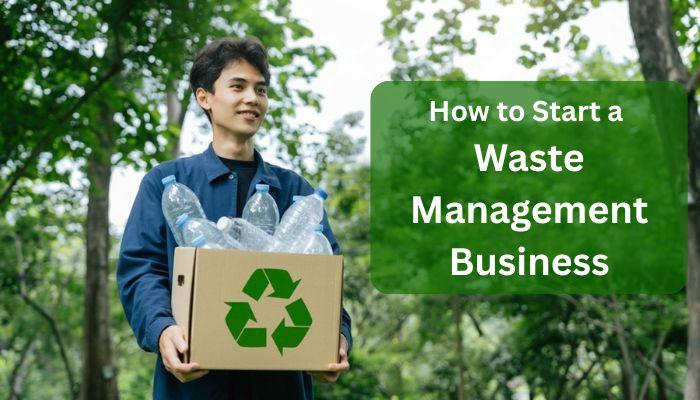As global populations rise and urban areas grow, waste management is more important than ever. With environmental concerns rising and sustainability becoming a bigger issue, starting a waste management business is not only socially responsible but also a highly profitable opportunity. Whether you want to recycle plastics, process e-waste, or sustain a site for landfill, this sector is ripe with possibilities.
In this extensive guide, I will detail everything you need to know about how to start a waste management business from idea to process, and review some interesting startups changing the landscape of the industry.
What is a Waste Management Business?
Any of these activities, that is, collection, transport, treatment, recycling, or disposal, could be engaged in by a waste management company. Waste could consist of municipal solid waste, hazardous waste, industrial waste, e-waste, organic waste, or an amalgamation of them.
The model may depend on the:
- The type of waste
- The type of processing
- The geographic marketplace
- Compliance with government regulations
Also Read: Regenerative Agriculture: The Future of Sustainable Farming
Why Start a Waste Management Company in 2025?
✅ Sustainability Demand Is Increasing
Governments and corporations have many initiatives that include sustainable waste solutions, leading consumers to want to engage with brands that operate with green initiatives
✅ Waste Is on the Rise
The world produces more than 2 billion tons of solid waste each year and that is expected to increase by 70% by the year 2050.
✅ Business Viability and Incentives
Countries across the globe are offering grants, allowances, and tax benefits to support new waste management start ups.
Types of Waste Management Businesses
Here are some profitable niches:
|
Waste Type |
Business Model |
| Solid Waste | Municipal collection, landfilling, sorting |
| Plastic Recycling | Collection + processing of plastic into pellets or products |
| E-waste Management | Refurbishment, recycling of electronics |
| Food/Organic Waste | Composting, biogas plants |
| Medical Waste | Safe disposal of waste from hospitals and pharmaceutical products |
| Construction Waste | Concrete, metal and building materials recycling |
| Hazardous Waste | More specialised handling and requires certification |
How to Start a Waste Management Business in 12 Steps
1. Conduct Market Research
Before you get started, it is important to understand:
- The statistics on waste generation locally
- The competition (how many waste management operators exist)
- Demand for recycling or disposal services
- Regulations affecting your business and compliance obligations
Tools to use: Government reports, municipal records, SWM (Solid Waste Management) reports, market surveys
2. Select Your Niche
Determine one type of waste management and focus on it. You will be more effective in the niche you identify and be more likely to make money.
Common niches in 2025 & beyond:
- E-waste recycling
- Food waste into compost
- Plastic-to-fuel technology
- Medical waste management
3. Create a Business Plan
A business plan made specific to your project should have the following sections:
- Executive Summary
- Market Analysis
- Operational Model
- Revenue Generation
- Equipment and Labor Costs
- Marketing Strategy
- Financial Needs
Tip: Always keep your plan handy for banks, investors, or grant applicants.
4. Register Your Business and Get Licenses
You will have to follow the relevant legal requirements.
Minimum requirements are:
- Business registration (LLC, Private Ltd., etc.)
- NOC from the Pollution Control Board
- Local municipality license
- If applicable, Hazardous Waste Handling certificate
In India, CPCB (Central Pollution Control Board) registration is a requirement for most waste businesses.
5. Arrange Funding
Sources of funding could include:
- Bank loans
- Angel investors
- Green startups funding
- Government grants or subsidies (for example, Swachh Bharat Mission India)
Budget:
- Setup cost (₹10 – 50 lakhs or $20,000 – 200,000, not including hiring costs)
- Equipment (price range varies importantly)
- Land and utility
- Transportation vehicles
6. Choose the Right Location
The main factors in choosing a workable location to consider are:
- Proximity of waste source (hospitals, factories, etc.)
- Zoning Laws
- Access to transportation
- Distance to landfill or processing plant
7. Obtain Equipment and Vehicles
Equipment required to run your business could vary from:
- Dump Trucks and loaders
- Shredders and balers
- Sorting conveyors
- Composting machines or incinerators
- Safety equipment for employees
If you are a small-scale business, you could lease some of the equipment before you commit to buy it.
8. Hire Skilled and Trained Workers
Waste management requires a trained workforce:
- Drivers and collection staff
- Technicians for sorting/recycling
- Safety office personnel
- Sales and marketing staff
- Waste auditors
Training your workforce in safety and waste procedures.
9. Develop Partnerships
Partner with:
- Municipalities
- Housing developments
- Hospitals and industries
- NGOs and recycling companies
Partnerships will help guarantee a steady supply of input waste materials.
10. Use Technology
Implement technology to make your business more efficient:
- GPS-based vehicle tracking
- Waste tracking software
- IoT smart bins
- Mobile apps for customer booking and pickups
11. Create a Brand and Marketing Plan
Market your business as environmentally friendly. Tell people you are working for sustainability.
Tactics:
- Search Engine Optimized website
- Social Media marketing
- Outreach programs in the community
- Corporate partnerships for B2B work
12. Manage Your Operation and Scale Slowly
Start operating locally. Refine your operation, then consider establishing in adjacent areas or expanding into new types of waste streams.
You could track your progress against KPIs such as:
- Waste collected versus waste processed
- Customer satisfaction
- Revenue per ton of waste
Also Read: Modern Agriculture Tools You Need to Know for Maximum Efficiency
Waste management startups to be inspired by
-
Recykal (India)
- Founded: 2016
- What they do: Digital waste management platform for businesses, municipalities and recyclers
- Innovation: Marketplace model for recyclables, blockchain technology for traceability
- Impact: More than 100,000 tons of waste recycled annually
-
TerraCycle (USA)
- Established: 2001
- What they do: Waste management of hard to recycle items such as cigarette butts and snack wrappers
- Thorough and unique model: Upcycling and free recycling programs for households and companies
- Worldwide: Operating in over 20 countries
-
Saahas Zero Waste (India)
- Established: 2013
- Focal point: End-to-end waste management for corporates and institutions
- Impact: diverts over 80% of client waste from landfills
- Basic model: Onsite waste processing, waste audits, awareness programs for staff and partners
-
Rubicon (USA)
- Established: 2008
- Industry: B2B cloud waste and recycling solutions
- Clients: 800+ clients, e.g., Starbucks, Walmart, and FedEx, etc
- Value Proposition: Enhance waste efficiency (and client costs) through data analytics and AI
-
Banyan Nation (India)
- Focal point: Technology driven plastic recycling
- Innovation: Asking for AI and mobile technology to get recyclables collected and sorted from waste
- Customers: Sourcing sustainability as their sustainable packaging partner
Obstacles in the Waste Management Industry
You can start strong, but success hinges upon your ability to face challenges:
⚠️ 1. Regulatory issues
External environmental laws can be complex and different outside the home jurisdiction. You must stay current.
⚠️ 2. Location challenges
The cost of fuel, space available for holding waste, and on-time and value-adding pickups can be daunting.
⚠️ 3. Waste Sorting
Awareness and willingness of the public to cooperate with segregation are still limited.
⚠️ 4. Competition
Market is dominated by established companies with contracts with government agencies making for competitive pricing.
Advice for Long-Term Success
- Provide education and awareness to customers and to your community to help them with proper disposal of waste
- Incorporate innovative technology for sorting like waste to energy or AI trending sorting
- Be transparent about your environmental footprint
- Practice the circular economy: reuse, reduce and recycle
- Comply with international frameworks for sustainability (like SDGs and ESG goals)
Advice for Long-Term Success provide education and awareness to customers and to your community to help them with proper disposal of waste
Sustainable Business Models in Waste Management
Here are some great business models that are both profitable and sustainable:
| Model | Description |
| Recycling Centers | Collect, process, and resell waste materials |
| Waste-to-Energy Plants | Convert organic or plastic waste into biofuel or electricity |
| Composting Services | Offer composting kits or handle organic waste for clients |
| Eco-Friendly Packaging | Make reusable products from waste |
| Waste Auditing & Consulting | Provide services to corporates for better waste practices |
Conclusion
The waste management industry is no longer simply about garbage disposal; it is about creating a green, profitable, and sustainable future. If you have always wanted to get started with waste management, if you wish to start small or go big, there are endless possibilities for environmental entrepreneurs in 2025 and beyond.
If you take the actions above, really know your market, and think outside the box, you can start a successful waste management business that creates a profit and creates impact.
FAQs
Q1: Is it profitable to run a waste business?
A: Yes, now that environmental initiatives are increased by government support, demand for reclaimed resources has risen, and commitments to sustainability are growing internationally.
Q2: Do I need certification to start a waste business?
A: Yes. Depending on the jurisdiction, you will need permits from municipal and environmental government agencies.
Q3: How much money do I need to start a waste business?
A: Costs can vary significantly from $10,000 to $200,000+, depending on the type of waste and how much you intend to deal with.
Q4: Can I operate a waste business from home?
A: Yes, absolutely. Home composting, recycling, collection services, or consulting can all operate from your home.




